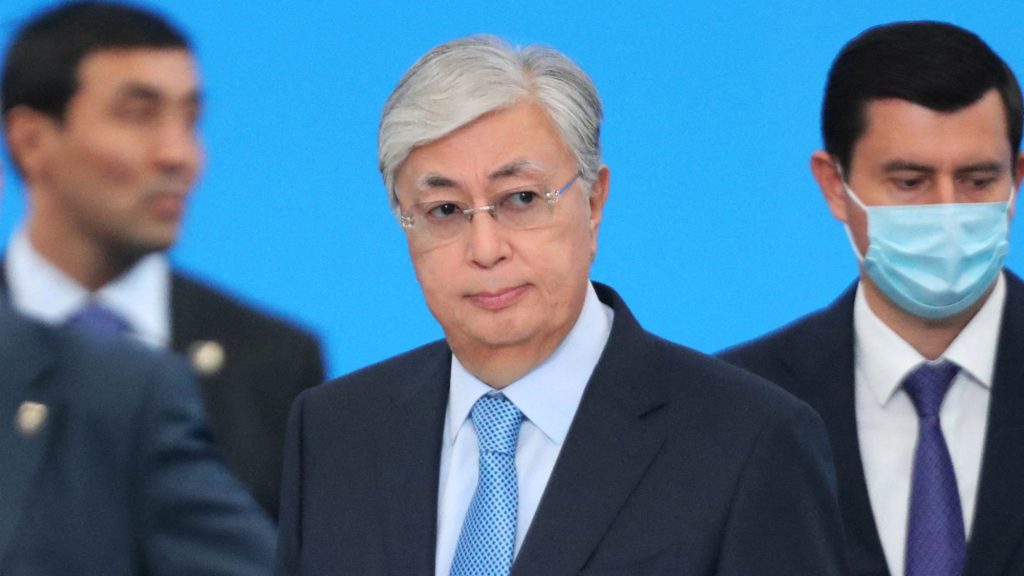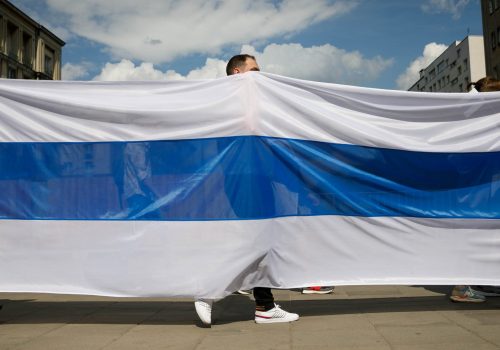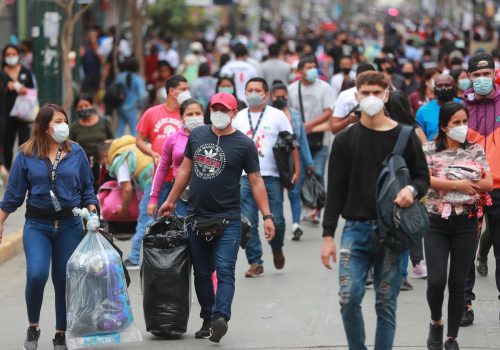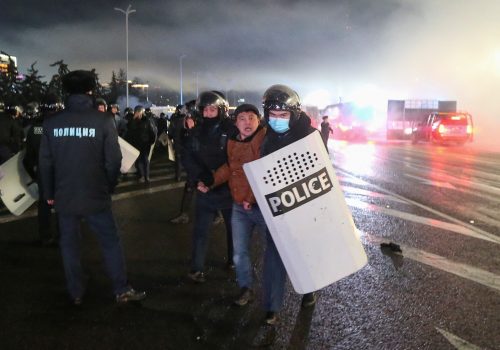This month, Kazakhs head to the polls to vote in a snap presidential election. Although the eventual winner of that election is not in doubt, the global reaction to it will have repercussions far beyond election night.
The snap poll, which is intended to offer a semblance of progress toward a competitive political environment in Kazakhstan, is the latest step in President Kassym-Jomart Tokayev’s makeover of the country’s politics—an effort to both strengthen Kazakhstan’s position on the world stage and shore up the regime’s domestic foundations.
In January, protests over rising fuel prices quickly spilled into all the country’s major cities. The regime was only saved after Tokayev called in supporting forces from the Collective Security Treaty Organization, a Russian-led military alliance, and ordered the shooting and arrest of protesters whom he later denigrated as drug smugglers and terrorists.
Tokayev’s moves to establish a measured democratization in the wake of January’s unrest have staved off further large-scale protests. Leaders in Astana likely feel stuck: A return to greater authoritarianism would only cause the pre-January fissures in society to fester, while a rapid liberalization, they believe, would threaten an immediate reprisal of the chaos of January.
Since Kazakhstan became an independent state in 1991, it has been a target in the sights of Russian foreign policy. Kremlin aggression has been a consistent threat to Kazakhstan’s national sovereignty and even territorial integrity. But after the Russian full-scale invasion of Ukraine, Astana distanced itself from Moscow, refusing to recognize Russia’s annexation of Ukrainian territory and harboring Russian citizens seeking to dodge the draft.
It is no coincidence that Tokayev is pursuing domestic liberalization at the same time. After the Kremlin invaded Ukraine, Western democracies have revealed themselves to be a competent counter to Moscow’s influence.
Ukraine secured Western support in no small part due to its burgeoning democratic institutions. Thus, authoritarian institutions have become a liability for Kazakhstan, jeopardizing Astana’s ability to leverage the West in opposing Moscow’s attempts to re-establish a sphere of influence in the region. As such, the liberalizing reforms of Tokayev are a step not only toward democracy but also toward the West and away from Russia.
Tokayev’s reforms carry symbolic weight because they promise to open a severely closed political system, but their practical effects are limited. The snap presidential election, for example, is supposed to be interpreted as the birth of a competitive political environment in Kazakhstan. In practice, however, the elections leave the opposition without time to organize and consolidate support, all but assuring Tokayev’s re-election and doing more to consolidate Tokayev’s authority than bring in any real competition.
If Tokayev’s reforms go no further, they risk falling short of their full potential as a geopolitical tool by alienating Western capitals, whose support is increasingly conditioned on serious democratic progress.
For leaders like Tokayev, close partnership with China presents an enticing counterbalance to both Russia and the West. The political model that China champions does not grant political freedom to the people, but it does preserve the elite in power and might unlock exponential economic growth.
China is also making efforts to court Kazakhstan, as Chinese leader Xi Jinping offered greater cooperation and support for Kazakhstan’s territorial integrity during his recent trip to the country.
In the process of exiting one imperial orbit, however, Astana does not seem eager to enter another. While Tokayev’s strategic ambiguity does not close the door to a closer alliance with Beijing—or a return to Moscow’s fold—it does open the window to Western alignment. But as long as Kazakhstan’s democratization stands incomplete, however, the West removing its support is an option; that would force Astana to choose between two autocratic spheres of influence.
Western engagement over the coming months and years is going to be crucial. After the snap presidential elections, Tokayev will find his domestic position stronger than ever. He’ll have the chance to halt or even reverse the changes he’s made to liberalize the country. But the West’s credibility and engagement provide a crucial incentive for Tokayev to continue his reforms and secure both democracy and sovereignty for Kazakhstan.
High-level visits to the country and economic partnerships could demonstrate Western interest in further engagement. Western countries can facilitate investment in the country and offer technical assistance for Kazakhstan’s leading private industries.
Western engagement should be Kazakhstan-specific and avoid viewing the country only through the lens of the wider Central Asian region. During that process, Western leaders should make clear what kind of democratic progress they would need to see in order to increase their engagement. Western diplomats should make clear that engagement is predicated on Kazakhstan’s reforms, and further partnership should be predicated on continued liberalization.
If Western attention is not forthcoming, the forces in Astana advocating for greater autocracy will only gain strength. They will argue that their fears have been realized, as elite power will be threatened by democratic forces without any geopolitical benefits to show for the effort.
It is up to Western leaders, then, to understand the situation that Kazakhstan’s leaders find themselves in and operate accordingly. They should support what nascent efforts exist and provide incentives to ensure continued liberalization. Western engagement and understanding with Kazakhstan will help to demonstrate the value of Tokayev’s moves, set clear expectations for what reforms are to accomplish, and spur the development of a Kazakh democracy.
The story of democracy in Kazakhstan has yet to be written, and at this critical moment, the West has a unique opportunity to determine whether Kazakhstan sees either the birth of a fledgling democracy or retrenchment to autocracy.
Benton Coblentz is a program assistant at the Atlantic Council’s Eurasia Center.
Further reading
Mon, Nov 7, 2022
The international community must prepare for a post-Putin Russia
UkraineAlert By
With little hope of a meaningful settlement as long as Vladimir Putin remains in power, the international community should seek pathways to a lasting peace with a future post-Putin Russia, writes Francis O’Donnell.
Mon, Oct 17, 2022
The Freedom and Prosperity Indexes: How nations create prosperity that lasts
The Big Story By Dan Negrea, Matthew Kroenig
The inaugural Freedom and Prosperity Indexes show that democracies do indeed deliver. It’s time to reset the terms of the debate by letting the data do the talking. And the indexes have a lot to tell us. They reveal the most effective ways for governments to invest in their most important resource: their people.
Wed, Jan 5, 2022
Kazakhstan is in chaos. Here’s why the West should be watching.
New Atlanticist By
Atlantic Council experts break down what's at stake for Russia, energy supplies, and the future of the strategically located Central Asian nation.
Image: Kazakh President Kassym-Jomart Tokayev attends the conclusion of the VII Congress of Leaders of World and Traditional Religions, at the Palace of Independence in Nur-Sultan, Kazakhstan on September 15, 2022. Photo via REUTERS/Pavel Mikheyev.



